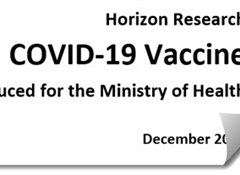News
Polling on COVID19 vaccine issues released
10 Mar 21

The Ministry of Health has released full reports on surveys by Horizon Research covering New Zealanders' attitudes toward COVID-19 vaccines.
In 2020, Horizon Research, in association with the School of Population Health, University of Auckland, was commissioned to survey New Zealanders’ attitudes and sentiment towards COVID-19 vaccines.
Two distinct but related online surveys were undertaken:
- 1,451 respondents between 24 and 28 September 2020
- 1,438 respondents between 1 and 4 December 2020.
Key insights
The following are some of the key insights in the findings:
Accepting a vaccine
- 69 percent (an estimated 2,487,900 adults) of respondents are prepared to receive a ‘well-tested and approved’ COVID-19 vaccine.
- Uptake is likely to be highest among those aged 65+.
Barriers to uptake
- 24 percent of respondents indicated that they would be unlikely to have a COVID-19 vaccine if offered.
- 16 percent of New Zealand adults will not accept an offered vaccine.
- Between the first and the second Horizon Research reports, there is a slight increase in overall vaccine hesitancy (if not a reduction in overall ‘acceptance’ numbers).
- Pasifika and Māori have less confidence in the safety and quality of the vaccine and of its protection.
People who are unlikely to take an offered COVID-19 vaccine are more likely to:
- be female
- have a lower household income than those who are likely to take a vaccine if offered
- have lower educational qualifications than those who are likely to take a vaccine if offered
- be a parent with children in their household.
Māori, Pasifika and Other European, and people who are 35–44 years, are less willing to take a follow-up vaccine.
In December, 72 percent (2,574,200) of respondents are prepared to have a follow-up dose if required, up three percent from September.
18 percent (an estimated 652,600 adults) are unlikely to have a follow-up dose if required.
Respondents of Māori, Pasifika and ‘Other European’ ethnicities had lower than average willingness to take a follow-up vaccine.
Safety
The major reasons for hesitancy towards a vaccine are concerns regarding the vaccine’s safety. This is particularly the case for females.
When considering whether to take a COVID-19 vaccine, the top four thoughts that New Zealanders have are about potential side effects.
A third of people believe vaccines can be approved without knowing all the potential side effects.
Downloads
Full copies of reports on both surveys can be downloaded surveys can be downloaded here.
HorizonPoll Online Survey system
and website developed by BEWEB
Copyright © 2010. HorizonPoll incorporating ShapeNZ - Listening to New Zealand


